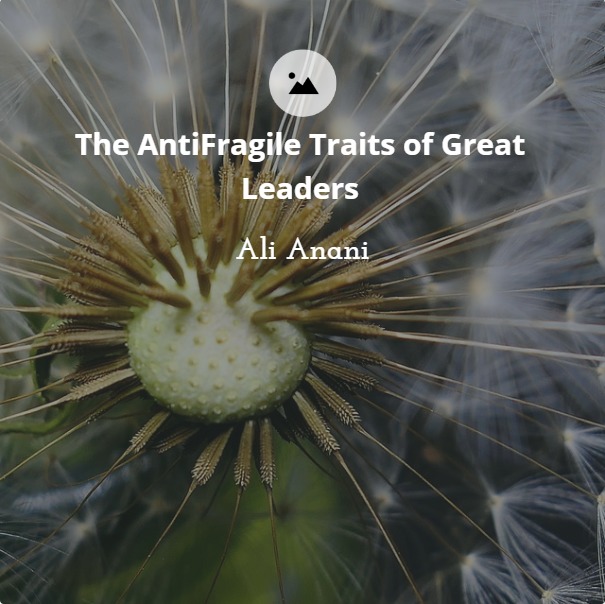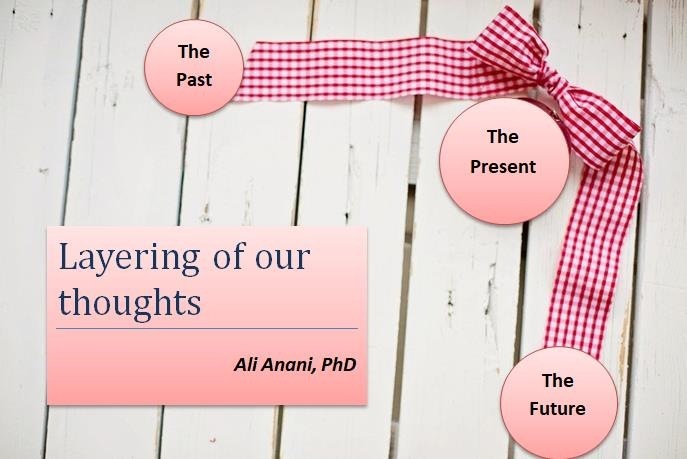The Antifragile Traits of Great Leaders

The question that I am addressing is are the traits of great leaders the same in old times as they are in modern times? Are these traits fixed or do they change by the prevailing conditions?
Our times are packed with rapid changes. A river changes its direction when its volume of water increases, so its acceleration and momentum leading to the river changing its direction. Wind changes its direction depending on many factors. Should an authentic leader change direction be depending on circumstances? Does changing direction require having attributes different from those leaders who face no such issue?
We talk about extraordinary leaders and what are their traits? What makes them extraordinary. So many questions to think about. This is an attempt to address them. Great leaders have vision and they know where to go. Having led people on a course would they be ready to change their vision should circumstances change? Or, they will resist change and continue on same course?
Some of leaders’ traits will not diminish with time such as their ability to influence others. They run the risk that this influence shall erode if the leaders decide it is time to change direction. I believe leaders in our rapidly-changing times need to be antifragile. Not only they are able to cope with the stress of change; more to appear stronger after the storm. Because these leaders emerge stronger they have the ability to still communicate to their followers and convince them of the need to change. Some traits need to be antifragile as well. For example, the sphere of influence can scale up from his team up to influencing the world without fading over time. There are leaders that we still quote and we feel their influence has not eroded over years. Great leaders are great influencers over time. Because of their great influence they keep people together even in times of turbulences and changing directions.
Extraordinary leaders accept the tension of rapid change and this tension makes them stronger. These leaders know how to be creative under tension. Stressed people lose their creativity; in contrast great leaders make use of this tension and may come up with creative ways to influence other and keep them glued to each other. The greater the change is, the stronger these leaders are and the more creative they become.
Great leaders are not afraid to change direction. Kodak lost its market because it didn’t shift to electronic cameras. The stress of change and the lack of accepting change made a very successful company go out of market. Great leaders stand the stress of change and are able to go with nature as the wind of change changes the direction of a business. But not all leaders have the communication skills to convince others for the need to change direction. In turbulent times being able to persuade others without causing conflict is a trait that is becoming increasingly evident.
It is evident from the above discussion that great leaders will have to take risks and convert them to opportunities. The risk is constantly on the rise. New technologies appear rapidly and many products are doomed to disappear from the market. The risk of change is increasing and I believe great leaders know well how to deal with risk.
Great leaders who have their influence still felt after long times have the traits that make leadership a lasting one and isn’t blown away by the wind of change.
Do you think that the traits of great leaders of the past are the same traits of great leaders today?
مقالات من Ali Anani
عرض المدونة
Organizations are like plants and forests- they all share initial growth, conservation, release and ...

If your care for your family life, performance at work and healthy living then this post may interes ...

The Golden Circle of asking questions is well-known. This circle consists of asking three basic ques ...
المتخصصون ذوو الصلة
قد تكون مهتمًا بهذه الوظائف
-

employee
تم العثور عليها في: DrJobEn JO A2 - منذ يومين
JRTVC Amman, الأردنà that holds a Bachelor 's degree , preferably in a specialized English language or libraries. · à not be less than average in high school 70% . · Al-Muqablain – Al-Zohour – Al-Hurriya Street – Al-Baniyat – Al -Yasmeen – Al-Hajj Hassan suburb – Al-Quweismeh – or Al-Ashrafiya One ...
-

car paint assistant
تم العثور عليها في: DrJobEn JO A2 - منذ يومين
Hummer car care center Amman, الأردنHummer car care center announces its need for a fat assistant (number 3) who masters the quilling of the plastic paste and the separator foundation in an excellent manner and has started three stages to be residents of Al-Muqabaleen or around it. For those who meet the conditions ...
-

Sales Executive
تم العثور عليها في: DrJobEn JO A2 - منذ 4 أيام
Client of AGIP Amman, الأردنlisten to customer requirements and present appropriately to make a sale · maintain and develop relationships with existing customers in person and via telephone calls and emails · cold call to arrange meetings with potential customers to prospect for new business · respond to in ...

التعليقات
Ali Anani
منذ 5 سنوات #38
I am comfortable with your comment Harvey Lloyd
Ali Anani
منذ 5 سنوات #37
I love your daring comment Milos Djukic and I appreciate it greatly. It is equally provocative in a good way. Right from the beginning you arose my interest "Leadership is not about getting people to understand and believe in your vision and to work with you to achieve your goals". I paused on this before I could comment to think. Leaders lead others. Leads them towards what? This is a great question. If they were leading themselves then they by discovery or by serendipity you may run across great discoveries. In doing research this is a great possibility because the research team will be focused on discovering and they are aware there work is exploratory in nature. In organization where there are many team members with different interests what would keep them together? What is the glue other than having a common goal? I am still thinking...
Ali Anani
منذ 5 سنوات #36
I add to your excellent comment Franci\ud83d\udc1dEugenia Hoffman, beBee Brand Ambassador leaders who find the fault remedy it. Sometimes not knowing the real fault will make the remedy useless.
Harvey Lloyd
منذ 5 سنوات #35
I enjoyed your comment here. I would add that leaders are first humans satisfying some motivational need they require. Both intrinsically and extrinsically. One of the 1st Principals is recognizing that each person is doing the same thing. Regardless of position. Organizing these motivational needs is where leaders are made and broken. Each person requires what they need from the organization.
Milos Djukic
منذ 5 سنوات #34
Ali Anani
منذ 5 سنوات #33
I am elevated by your comment dear . * appreciate your sharing the buzz as well. I published a buzz following on this one. I hope they both register with you
🐝 Fatima G. Williams
منذ 5 سنوات #32
Ali Anani
منذ 5 سنوات #31
There is a common quote that it is more important to reduce risk than making profits. Survival is a strong glue for people to work for survival. Focusing on profits may lead to greed and competition. However; I take your point seriously Joanne Gardocki need time to fully absorb.
Ali Anani
منذ 5 سنوات #30
You said it perfectly well Randall Burns. Your comment is a gem. I invite you to write a buzz to explore in more depth the value of your comment.
Ali Anani
منذ 5 سنوات #29
Thank you CityVP \ud83d\udc1d Manjit mentioned in his comment #23 the innate skills and experiences of leaders are to be aligned. The complexity requires leaders who allow for interactions among team members so that they may find the strengths and desires of each member. The leaders' role is to create the environment to allow for the free flow of info and the exchange of thoughts. This will allow teams to self-organize around a common goal with each team member doing what he desires and is skillful in doing.
Ali Anani
منذ 5 سنوات #28
Joanne Gardocki. The name of the game for me is leaders who create the environment for people to interact and self-organize. The leader know the shift in his/her role in modern times and its complexity., Too many interactions lead to complexity because of the tremendous opportunity for interacting. The leader who realizes these changes know will be aware that the best for work is to let teams have their own say. The leader will be watching from distance and suggesting whenever a need arises.
Randall Burns
منذ 5 سنوات #27
I absolutely agree Ali \ud83d\udc1d Anani, Brand Ambassador @beBee That's what differentiates a "Leader" from a tyrant/dictator. my point was that even with all the resources, support that a leader has the very weight of them, of the "responsibility" can be overwhelming. This is where the "anti-fragile" traits are so important; a "leader" has the ability to carry all this "weight" and still be "light on his feet", make split second decisions, take feedback humbly and intelligently all with a smile and no worry on his face.
Ali Anani
منذ 5 سنوات #26
Joanne Gardocki- your subtle comment made me pause while reading it. One observation is your writing " If we compile a list of extraordinary leaders in history, the vast majority are associated with war". Even the best book about leaders are leaders during wars. There is a reason. Survival need makes make it much easier for leaders to unite people and form a floating raft so that people wouldn't sink in the waters of trouble. We have different survival issues these days. Looking at statistics and the number of falling companies make it clear that survival is an issue. I believe that it is the failure of some leaders to highlight the survival issue to the employees that keeps those people from following the survival goal. If so, again persuasion ability is a major traits of great leaders.
Ali Anani
منذ 5 سنوات #25
y question is that not all experiences are the same and some leaders have been gaining the same experience. They say they listen, but do they actually do? The listening ability, and I mean genuine listening, is one of the great traits of leaders because they benefit from feedback. If all leaders were listening then why don't we have that many great leaders?
Ali Anani
منذ 5 سنوات #24
I agree on one condition- that the leader is ready to accept feedback. Having the resources is one thing; using them probably is another. Do you agree Randall Burns
Ali Anani
منذ 5 سنوات #23
Bill King- You remind me of the birds' flocks. When the leading bird gets tired because it has no bird above it to flap the air and reduce air pressure that makes the below below exert 78% less flying effort and becomes too exhausted to lead it voluntarily slips back and another bird takes the leading role. This is a Natural Leadership that goes with nature and not against it. I therefore agree in full with your comment.
CityVP Manjit
منذ 5 سنوات #22
Jerry Fletcher
منذ 5 سنوات #21
Randall Burns
منذ 5 سنوات #20
Great comment I totally understand your point about stress but it boils down to a personal strategy for dealing with it, (that's probably what differentiates a great leader from a mediocre one) . Here's something that is applicable that you might appreciate; https://www.bebee.com/producer/@randall-burns/stress-the-dynamics-in-a-professional-kitchen Agreed that a "Leader" has more resources to draw upon for support but by the same token it is a "double edged sword" in that it is more responsibility to be encumbered with. Again it comes down to the personal action/reaction of each individual person and while your sentiment of; "... In short, with all of these resources at hand, providing them with ideas, advice and guidance, it seems to me it's far easier for them to incorporate a few of the ideas these resources provide. Which, no doubt, will improve a leader's ability to access their creativity, to utilize it move forward..." ...seems logical and straightforward, that is not always the case.
Ali Anani
منذ 5 سنوات #19
Egoism and selfishness are the characters of leaders who are not. Yes, John Rylance you highlight a very important trait of leaders who have influenced our lives purposefully. They didn't say we did it ourselves; rather my collaborators did. In spite of this people still remember them for they acted in a manner that very few people can do. Yes, leaders of the past are still living with us for they were and are still genuine leaders.
John Rylance
منذ 5 سنوات #18
Ali Anani
منذ 5 سنوات #17
Again, your comment I consider is a beautiful prelude to my next buzz. Let me leak some information. Not only volcanoes and earthquakes follow the power law. Ideas, leaders and many other human complex systems again follow the same law. By this I mean there are few devastating earthquakes, some average ones and mostly unnoticeable ones. Leaders follow the same token. Few are extraordinary, some are average and mostly leaders by title. Those extraordinary leaders have a unique trait- they care to get feedback and welcome criticism. We have leaders who genuinely seek feedback and then bear the accountability of their decisions. If not, why extraordinary leaders are the exception rather than the rule. Seeking feedback with genuine desire to learn, collect idea and info before making decisions are not practiced equally by all leaders. Many leaders as soon as they hear criticism they turn again the person. I wonder how many great leaders have you met in your life. The power of leadership is to melt all ideas so that their magma would erupt the disruptive ideas. You make me think. If all leaders were to pay attention to the feedback of their staff would they feel isolated, disengaged or unhappy? Who is responsible for stressing them?
Ali Anani
منذ 5 سنوات #16
The complexity of leadership traits originate possible because of the interactions of these traits and how they feedback to each other. In my next buzz I am going to handle this complexity. Yes, character is a crucial trait. I recall my post on LI titled Character Quotient and the need to understand character more than understanding IQ or EQ (Intelligence Quotient and emotional quotient) respectively. Thank you for bringing this issue to light.
Ali Anani
منذ 5 سنوات #15
The complexity of leadership traits originate possible because of the interactions of these traits and how they feedback to each other. In my next buzz I am going to handle this complexity. Yes, character is a crucial trait. I recall my post on LI titled Character Quotient and the need to understand character more than understanding IQ or EQ (Intelligence Quotient and emotional Wuotient) respectively. Thank you for bringing this issue to light.
Mohammed Abdul Jawad
منذ 5 سنوات #14
Ali Anani
منذ 5 سنوات #13
Gert Scholtz- your extension of the meaning of extraordinary leaders is fabulous. Yes, for those leaders know staying in the comfort zone is not the way to go. Hence, I believe strongly that tension thinking is a field that needs more attention and merits more discussions. Situational leadership is a widely accepted and this is important when the situation calls for immediate decisions. You are tension-seeker my friend.
Ali Anani
منذ 5 سنوات #12
I love your analogy dear Debasish Majumder. You are very correct. This is why say that few leaders stand the test of time because they can evolve. Adaptation to the forced external conditions and their tension make great leaders stronger than they were before. Thank you also for sharing the buzz my friend.
Gert Scholtz
منذ 5 سنوات #11
Gert Scholtz
منذ 5 سنوات #10
Debasish Majumder
منذ 5 سنوات #9
Ali Anani
منذ 5 سنوات #8
We have many things in common between us Randall Burns. The Art of War is a book that shows why Sun Tzu is a leading writer and strategist. He wrote a book that stands out after so many years. It keeps influencing us, persuading us and guiding our thinking. Its extrapolation to other fields such as businesses shows its impact on the generations. You remind me of Boyd's OODA Loop. Yes, and the question is what makes some leaders take a split-second decisions and others decide not. Quick changes require alert minds. and daring minds.
Randall Burns
منذ 5 سنوات #7
Thank You Ali \ud83d\udc1d Anani, Brand Ambassador @beBee! That is one my favorite books that I keep on my shelf and pass out to anyone and everyone, especially my staff, (it sits right next to Herman Hesse's "Siddhartha"). "Rate of change" comes down to a matter of perspective, yes we are going through changes at a dramatically accelerated rate, or so it seems. In another time and another place a "Leader" would have to make split second decisions with many lives at stake on the battlefield where changes are happening quickly as well as well. I must state here that I am very anti-war but I think this example is applicable. Another favorite book that sits on the same shelf is Sun Tzu's "Art of War". I'm sure that you're familiar with it. It is a great philosophical/strategic tome and one of the greatest leadership lessons in it is that the best general/leader will never actually have to fight; "The supreme art of war is to subdue the enemy without a fight"
Ali Anani
منذ 5 سنوات #6
Antifragility is a term that Nassem Taleb coined. My contribution here is to use his term in figuring out what are the antifragile traits of great leaders. Some traits must be antifragile so that we may have an antifragile leader.
Ali Anani
منذ 5 سنوات #5
Thank you Randall Burns for your great comment @quote of who are the leaders. Yes, influencing self isn't enough; more it is convincing others. You remind me of Jonathan's Seagull. It was enough for the leader seagull to fly higher; more important for him was to persuade others to fly higher and discover the world in more depth. Exactly, leaders have always met change challenges. May be today the rate of change is much greater and that is why great leaders must have antifragility. ave the traits that make them stand for the test of change.
Ali Anani
منذ 5 سنوات #4
Very bold perspective Pascal Derrien. Great thinkers aren't necessarily great leaders. One big difference for me is their influence over time and if it decays or not. Their influence and persuasion will continue to live with us. Some great thinkers lack these traits. So, basically I agree with you.
Randall Burns
منذ 5 سنوات #3
Randall Burns
منذ 5 سنوات #2
Pascal Derrien
منذ 5 سنوات #1